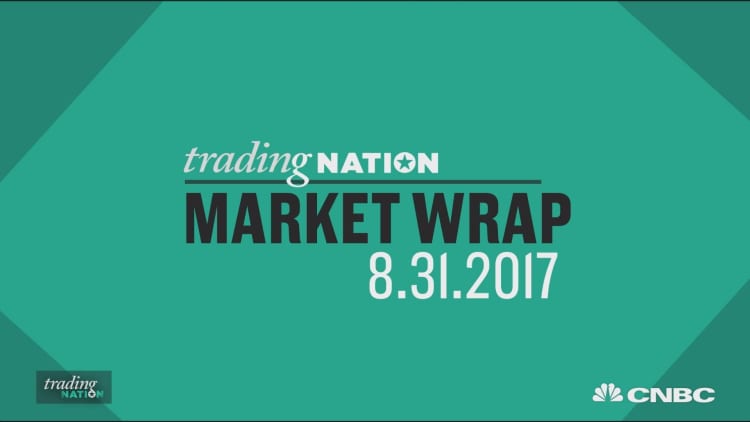
U.S. stocks closed higher on Thursday, the last trading day of the month, as Wall Street ended August on a high note. Investors also digested a broad swath of economic data ahead of a key employment report.
The Dow Jones industrial average rose 55.67 points to close at 21,948.10, with UnitedHealth contributing the most to the gains. The gained 0.57 percent to end at 2,471.57, with health care leading nine sectors higher. The Nasdaq composite advanced 0.95 percent to 6,428.66, a record close.
Major U.S. Indexes
For the month, the Dow and the S&P 500 notched five-month winning streaks, while the Nasdaq recorded its ninth positive month in 10.
"Everyone is looking for the negative catalyst and we just haven't gotten it," said Anthony Conroy, president at Abel Noser. "In turn, what we've seen is some solid returns."
"I think there are no signs of that stopping," Conroy said.
Wall Street has dealt with different issues throughout the month, including political uncertainty, geopolitical tension and a storm that ravaged Houston and other parts of South Texas.
President Donald Trump alienated key members of Congress in August, including House Speaker Paul Ryan and Senate Majority Leader Mitch McConnell, raising concern about whether the White House will be able to pass tax reform legislation.
However, Treasury Secretary Steven Mnuchin told CNBC on Thursday that the Administration has a "very detailed" tax plan, adding they expect to push it through before year-end.
Meanwhile, worries about the tension between the U.S. and North Korea were reignited this week, after North Korea fired a missile that flew over Japan. All that said, stocks were on track for a steady monthly performance.
Aug. 21 "marked a near-term low for the market and stocks have bounced back from it. Two days ago, we also saw another near-term low that the market rebounded from," said Adam Sarhan, CEO of 50 Park Investments. "Investors are now looking for clues as to where does the market go from here."
Investors also digested key economic data released Thursday.
Weekly jobless claims totaled 236,000, matching estimates, while the so-called core personal consumption expenditures increased 1.4 percent in July on a year-over-year basis, the smallest gain since December 2015. The core PCE is the Federal Reserve's preferred measure of inflation, and it's lagging the central bank's 2 percent target.
"That's a terrible number if you're looking for inflation," said Mary Ann Hurley, vice president of fixed income trading at D.A. Davidson. "The Fed has a dual mandate: a labor mandate and an inflation mandate."
"I think these low inflation prints are going to keep the Fed on hold," Hurley said.
Market expectations for a December rate hike were just 31 percent on Thursday, according to the CME Group's FedWatch tool.
Treasury yields fell after the inflation data were released. The benchmark 10-year note yield traded at 2.133 percent, while the two-year yield traded near 1.33 percent.
Other economic data released Thursday included pending home sales, which fell 0.8 percent in June. The data deluge comes a day ahead of the Bureau of Labor Statistics' monthly employment report, which is scheduled for release on Friday at 8:30 a.m. ET.
Overseas, stocks got a boost from strong economic data. In Europe, the Stoxx 600 index rose 0.8 percent after euro zone inflation hit 1.5 percent on a year-over-year basis in August, marking the highest rate in four months. Asian stocks closed mostly higher overnight after China's official manufacturing PMI topped expectations.
The positive overseas data followed strong economic numbers out of the U.S. On Wednesday, the U.S. government said the economy grew at an annualized rate of 3.0 percent on an annualized basis, above the expected gain rate of 2.7 percent.


